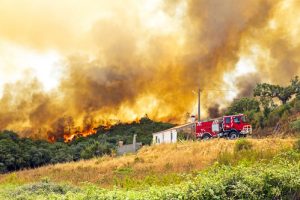CALIFORNIA — The Mendocino Complex fire scorches to more than 273,000 acres and is now the 2nd-largest wildfire in California’s history after Thomas Fire. It continues to leap across natural and man-made barriers in Lake County, officials said Tuesday morning.
According to Cal Fire, the two complex fires, the Ranch and River fires, had grown to 273,664 acres as of Monday morning. The blaze was only 30% contained as of 7 a.m. Monday, but officials expect to achieve full control of the flames by next week.
The blaze is on pace to become the largest wildfire in state’s history after Thomas fire, which had a line of over 281,000 acres in Ventura and Santa Barbara counties late last year.
Officials said the Mendocino Complex fire has continued to grow by thousands of acres each day, even at night, when most fires normally calm down.
Evacuations are caused in Mendocino, Lake and Colusa counties. It has been less destructive to property than some of the other dozen-plus wildfires burning across the state because it continues to rage in remote areas.
But the fire’s sheer size and rate of spread is the latest signal of a remarkable fire year for California.
“It is extremely fast, extremely aggressive, extremely dangerous,” said Scott McLean, a deputy chief with the California Department of Forestry and Fire Protection.
Years of drought have created ripe conditions for large-scale wildfires that spread rapidly. There are 5 largest wildfires in state history, 4 of which have occurred since 2012.
In Redding, the Carr fire has claimed seven lives and more than 1,000 homes while growing to roughly 160,000 acres in size. Rescue crews there have been repeatedly hamstrung by intense heat and difficult terrain.
Meteoroligts issued red flag warning around the Northern Californi where the fires raged in. The temperatures will reach the triple digits in several neighborhoods and cities early in the week.
Woodland Hills could see a high of 108, while Santa Clarita and Burbank could all see the rise above 100 before Tuesday, according to the National Weather Service. Farther north, other cities that could experience 100-degree-plus heat are Ojai in Ventura County and Paso Robles in San Luis Obispo County.




